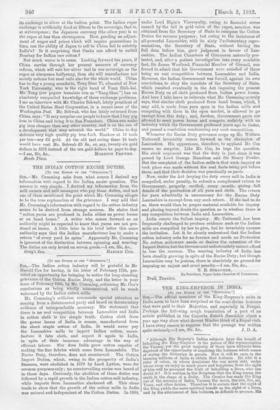INDIA, CHINA, JAPAN: THE EXCHANGE PROBLEM.
[To THE EDITOR OF THE " SPROTITOR."1
do not say that it is remarkable, but it is noteworthy that your correspondent, Mr. Harold Cox, in contrasting the competition of Japan and India for the China market, makes no reference to the conditions of the Exchange. Both India and Japan " enjoy " gold standards, but they have silver cur- rencies of unlimited legal tender, and they sell cottons to China, which is practically the last of the nations to regulate its exchange in silver at the bullion point. The Indian rupee exchange is artificially fixed at fifteen to the sovereign, that is, at sixteenpenee ; the Japanese currency (the silver yen) is as the rupee at less than elevenpence. How, pending an adjust- ment of wages and prices which will require generations in time, can the ability of Japan to sell to China fail to outstrip India's P Is it surprising that Osaka can afford to outbid Bombay for Indian raw cotton
But much worse is to come. Looking forward ten years, if China carries through her present measure of currency reform, which will rate her silver tael to our sovereign as the rupee at ninepence halfpenny, then she will manufacture not merely cottons but steel rails also for the whole world. China has to-day a young mandarin, Tong Shao Yi, educated at New York University, who is the right hand of Yuan Shih-kai. Mr. Tong (our papers translate him as "Tang Shao ") has an absolutely unequalled knowledge of these exchange problems. I see an interview with Mr. Charles Schwab, lately president of the United States Steel Corporation, in a recent issue of the Washington Post. Mr. Schwab, who has lately returned from China, says : It may surprise our people to know that I buy pig iron in China and bring it to San Francisco. China can make pig iron cheaper than any other country, and is on the eve of a development that may astonish the world." China to-day delivers very high quality pig iron f.o.b. Hankow at 16 taels per ton—say 42 gold. At the old tael rating these 16 taels would have cost Mr. Schwab 25 6s., or, say, twenty-six gold dollars in 1873 instead of the ten gold dollars he pays-to-day.
Brede Place.











































 Previous page
Previous page